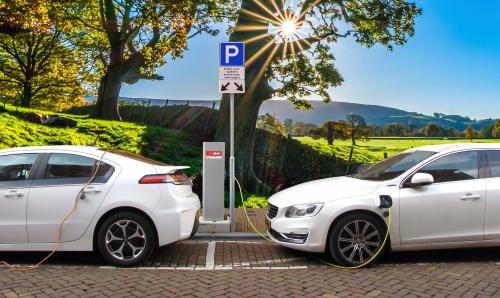The Environmental Benefits Of Electric Cars: A Greener Road Ahead

In recent years, electric cars have made significant strides
in reshaping the automotive landscape. As concerns about climate change and air
quality grow, the transition to electric vehicles (EVs) represents a crucial
step towards a more sustainable and environmentally friendly future.
This article explores the myriad of environmental benefits
that electric cars bring to the table and their potential to revolutionize the
way we drive.
1. Reduced Greenhouse Gas Emissions
One of the most prominent advantages of electric cars is
their ability to drastically
reduce greenhouse gas emissions. Unlike traditional gasoline-powered
vehicles, which emit carbon dioxide (CO2) and other pollutants from their
tailpipes, electric cars produce zero tailpipe emissions.
This means that when charged with electricity from clean and
renewable sources, EVs have the potential to be nearly carbon-neutral.
2. Improved Air Quality
Electric cars also contribute to improved air quality in
urban areas. Internal combustion engine vehicles release harmful pollutants
like nitrogen oxides (NOx) and particulate matter, which are detrimental to
both human health and the environment.
Electric cars produce
no such emissions, helping to mitigate air pollution and reduce the risk of
respiratory diseases in densely populated areas.
3. Energy Efficiency
Electric cars are inherently more energy-efficient than
their gasoline counterparts. Internal combustion engines waste a significant
portion of their energy as heat, while electric motors convert a higher
percentage of the energy from the grid into actual movement.
This efficiency translates into less energy consumption per
mile travelled, reducing overall energy demand and greenhouse gas emissions
associated with electricity generation.
4. Renewable Energy Integration
The environmental benefits of electric cars can be further
amplified when they are charged using electricity from renewable sources such
as wind, solar, or hydropower. The synergy between electric vehicles and
renewable energy is a powerful combination that can significantly reduce the
carbon footprint of transportation.
By integrating more renewables into the grid and promoting
their use for charging, we can make EVs even greener.
5. Reduced Noise Pollution
Electric cars are notably quieter than traditional vehicles
with internal combustion engines. This reduction in noise pollution is not only
more pleasant for drivers and pedestrians but also has environmental
implications.
Less noise pollution can benefit wildlife in urban areas and
contribute to a more serene and peaceful urban environment.
6. Lower Operating Costs
While the initial purchase price of electric cars can be
higher than that of their gasoline counterparts, they often have lower
operating costs. Electricity is generally cheaper than gasoline, and EVs have
fewer moving parts, reducing maintenance and repair expenses.
Over time, these cost savings can offset the higher upfront
price, making electric cars an economically attractive option for consumers.
7. Extended Battery Life
Electric car manufacturers have been working on improving
battery technology, not only to increase range but also to extend battery life.
Longer-lasting batteries reduce the need for frequent replacements, reducing
the environmental impact associated with battery production and disposal.
8. Promotion Of Sustainable Transportation
Electric cars are often seen as part of a broader shift
toward sustainable transportation. When combined with other modes of
eco-friendly transport like public transit, cycling, and walking, electric
vehicles can help reduce congestion and promote a more sustainable and
integrated transportation system.
9. Government Incentives
Many governments around the world are incentivizing the
adoption of electric cars through subsidies, tax
breaks on some vehicles, and preferential treatment in terms of parking and
access to restricted areas.
These incentives not only make electric cars more affordable
for consumers but also encourage the development and growth of a greener
automotive industry.
10. Reduction In Oil Dependency
Electric cars reduce a country's dependence on imported oil,
which can have geopolitical and economic advantages. By shifting towards
domestically generated electricity as a primary source of transportation
energy, nations can enhance their energy security and reduce their
vulnerability to global oil price fluctuations.
Driving A Greener Future
Electric cars offer a multitude of environmental benefits
that have the potential to revolutionize the way we travel. From reducing
greenhouse gas emissions and air pollution to promoting renewable energy
integration and improving energy efficiency, electric vehicles are paving the
way for a greener, more sustainable future.
As technology continues to advance and charging
infrastructure expands, electric cars are poised to play an even more
significant role in the global effort to combat climate change and protect our
planet.
Post Your Ad Here
Comments